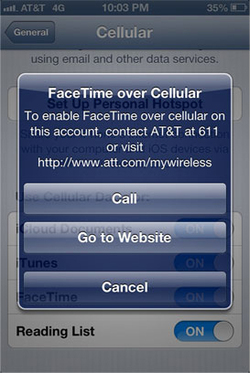
Since Apple introduced FaceTime video chat in 2010, iPhone owners have grumbled about its WiFi-only restriction. Video chat is great, but how often are you and your friend both on WiFi? It's no wonder iPhone video calling hasn't exactly taken the world by storm.
 iOS 6, though, is set to turn the tables. The upcoming update to Apple's mobile operating system will allow you to use FaceTime over 3G (and likely LTE). Problem solved, right?
iOS 6, though, is set to turn the tables. The upcoming update to Apple's mobile operating system will allow you to use FaceTime over 3G (and likely LTE). Problem solved, right?
Wrong.
Enter AT&T. If you're a developer with the latest iOS 6 beta, try activating FaceTime over 3G on AT&T. You can't. As originally reported by 9to5Mac, you'll be greeted with a popup message, requiring you to contact AT&T about FaceTime calling.
This message means that AT&T is probably going to nickel and dime us for using FaceTime. CEO Randall Stephenson all but confirmed the move. According to TechCrunch, he said that he heard the rumor, but "it's too early to talk about pricing."
Why are we talking about "talking about pricing?" FaceTime uses the same data that we've already paid for. There's nothing fancy about it; it's video that streams two ways. If you have a 3GB plan, every bit of a FaceTime call will count towards that plan.
If it could, AT&T would charge you a fee to call your grandmother on her birthday. Few customers expect reasonable pricing from their carriers, but cellular FaceTime fees could set a precedent for even more absurd charges down the road. What's next, iMessage fees? A Netflix tariff? An expensive plan for sending a few lines of text to friends? Oh wait, that one's already covered.
FaceTime fees and personal hotspot plans make the same amount of sense: none. When unlimited data plans were the norm, you could have argued the legitimacy of hotspot fees. They prevented customers from blazing through gigabytes upon gigabytes of data without paying anything extra. Fair enough. But what about now, when (almost) all of us have capped plans? In both cases, we're paying twice for the same data.
It's hard to imagine other industries getting away with this. What if Amazon sold you an ebook, but charged you an extra fee to read it on your iPad? Or if your power company charged by the kilowatt, but added an extra fee to use that metered electricity on an air conditioner? There would be no justifiable logic, apart from padding bank accounts.
Fortunately, iPhone customers have options. Though Verizon often goes where AT&T goes, The Wall Street Journal reports that Sprint won't charge for FaceTime. Several prepaid operators and regional carriers also now sell or support the iPhone, and it's unlikely they'll add these fees.
It would be naive to expect wireless carriers to prioritize fairness over profit, but that doesn't mean we are powerless. Choice benefits customers, and AT&T's iPhone monopoly is long since dead. Vote with your wallet, and choose the wireless providers who are content to bill you once for your data.
Top image via MacRumors
